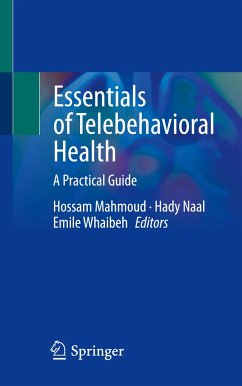Telebehavioral Health (TBH), defined as the use of information and telecommunication technologies for remote behavioral health service delivery, has witnessed exponential growth in recent years. The increase in TBH adoption can be attributed to several factors such as: increasing demand for behavioral health services, increasing availability of high-speed internet, decreasing cost of technology, expansion of reimbursement, and growing scientific evidence demonstrating its effectiveness across various patient populations, psychiatric conditions, and clinical settings. The COVID-19 pandemic further catapulted TBH expansion and scaling, as social distancing and lockdown measures left both clinicians and patients with limited alternatives.
Essentials of Telebehavioral Health: A Practical Guide comes at a time when TBH's effectiveness is well-established, its position in healthcare systems secure and uncontested, and the conversation around it shifting from "if" to "how" it could be implemented. The success of TBH programs is contingent on the careful planning, meticulous implementation, and continuous monitoring and evaluation of its essential components, with special emphasis on clinical, technical, legal and ethical considerations. While there are existing resources that offer road maps for TBH program implementation, what this book provides is hands-on support and guidance to set up and maintain a TBH practice, focusing on both its programmatic and clinical aspects. Its simple structure, succinctness, and scientific rigor make it suitable for both professional and educational settings. In addition to contributing to the writeup, the editors enlisted several authors with a wealth of practical knowledge and firsthand clinical experience on TBH implementation and delivery. The user experience is enhanced through explanatory figures, synthesis tables, visual aids, end-of-section checklists, and summaries in bullet-point format.
Essentials of Telebehavioral Health: A Practical Guide is a concise and evidence-based guide that synthesizes decades' worth of knowledge and experience into key pointers for clinicians, professionals, and interested learners on how to plan, implement, deliver, evaluate, and ensure the sustainability of TBH programs. As the most up-to-date text on TBH, this book serves as a go-to resource for healthcare professionals, clinicians, students and trainees with minimal to no formal education on TBH, to work towards adopting this modality in a synthesised and easy to read format.
Hinweis: Dieser Artikel kann nur an eine deutsche Lieferadresse ausgeliefert werden.
Essentials of Telebehavioral Health: A Practical Guide comes at a time when TBH's effectiveness is well-established, its position in healthcare systems secure and uncontested, and the conversation around it shifting from "if" to "how" it could be implemented. The success of TBH programs is contingent on the careful planning, meticulous implementation, and continuous monitoring and evaluation of its essential components, with special emphasis on clinical, technical, legal and ethical considerations. While there are existing resources that offer road maps for TBH program implementation, what this book provides is hands-on support and guidance to set up and maintain a TBH practice, focusing on both its programmatic and clinical aspects. Its simple structure, succinctness, and scientific rigor make it suitable for both professional and educational settings. In addition to contributing to the writeup, the editors enlisted several authors with a wealth of practical knowledge and firsthand clinical experience on TBH implementation and delivery. The user experience is enhanced through explanatory figures, synthesis tables, visual aids, end-of-section checklists, and summaries in bullet-point format.
Essentials of Telebehavioral Health: A Practical Guide is a concise and evidence-based guide that synthesizes decades' worth of knowledge and experience into key pointers for clinicians, professionals, and interested learners on how to plan, implement, deliver, evaluate, and ensure the sustainability of TBH programs. As the most up-to-date text on TBH, this book serves as a go-to resource for healthcare professionals, clinicians, students and trainees with minimal to no formal education on TBH, to work towards adopting this modality in a synthesised and easy to read format.
Hinweis: Dieser Artikel kann nur an eine deutsche Lieferadresse ausgeliefert werden.








